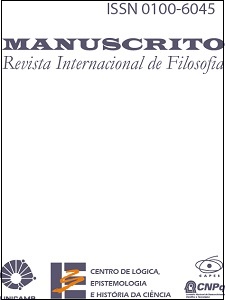Resumo
One of the many puzzles philosophy is dealing with is how meaning comes about. An increasing number of investigations in cognitive science indicate that the body plays a central role in grounding the meaning of concepts and language. Particularly there are many indications that our abilities to move, perceive and act upon the world are directly related to our capacity to understand linguistic expressions. In this paper we will review some of the more salient findings in this area of research and indicate their consequences for the debate about how meaning and body are related.
Referências
BARSALOU, L.W. “Being there conceptually: Simulating categories in preparation for situated action”. In: N.L. Stein, P.J. Bauer, M. Rabinowitz (eds.). Representation, Memory, and Development: Essays in honor of Jean Mandler. Mahwah, NJ: Erlbaum, pp. 1-19, 2002.
BERGEN, B. “Experimental methods for simulation semantics”. To appear in M. Gonzalez-Marquez, I. Mittelberg, S. Coulson, M. J. Spivey (eds.). Methods in Cognitive Linguistics. Ithaca: John Benjamins. (In press).
CHIEL, H.J., Beer, R.D. “The brain has a body: Adaptive behavior emerges from interactions of nervous system, body and environment”. Trends in Neurosciences, 20(12), pp. 553-556, 1997.
CHWILLA, D.J., KOLK, H.J., VISSERS, C. “Tracking the time-course of the creation of new meanings”. Poster Presented at the Annual Meeting of the Cognitive Neuroscience Society. New York, April 2005.
CLARK, A. Being There: putting brain, body, and world together again. Cambridge, Mass.: The MIT Press, 1997.
GLENBERG, A.M., Kaschak, M.P. “The body’s contribution to language”. The Psychology of Learning and Motivation, 43, pp. 93-126, 2003. Manuscrito – Rev. Int. Fil., Campinas, v. 29, n. 2, pp. 753-764, jul.-dez. 2006.
THE EMBODIMENT OF MEANING 763 GLENBERG, A.M., Robertson, D.A. “Symbol grounding and meaning: A comparison of high-dimensional and embodied theories of meaning”. Journal of Memory and Language, 43, pp. 379-401, 2000.
HARNAD, S. “The symbol grounding problem”. Physica D, 42, pp. 335- 346, 1990.
HASELAGER, W.F.G. “O mal estar do representacionismo: sete dores de cabeça da Ciência Cognitiva” (The indisposition of representationalism: Seven headaches of cognitive science). In: A. Ferreira, M.E.Q. Gonzalez, J.G. Coelho (eds.). Encontros com as Ciências Cognitivas, v. 4. São Paulo: Coleção Estudos Cognitivos, pp. 105-120, 2004.
KASCHAK, M.P., MADDEN, C.J., THERRIAULT, D.J., YAXLEY, R.H., AVEYARD, M., BLANCHARD, A.A., ZWAAN, R.A. “Perception of motion affects language processing”. Cognition, 94, pp. 79-89, 2005.
KUTAS, M., HILLYARD, S.A. “Reading senseless sentences: Brain potentials reflect semantic incongruity”. Science, 207, pp. 203-204, 1980.
LAKOFF, G., JOHNSON, M. Philosophy in the Flesh: The embodied mind and its challenge to western thought. New York: Basic Books, 1999.
MANDLER, J.M. “Precursors of linguistic knowledge”. Philosophical Transactions of the Royal Society, 346, pp. 63-69, 1994.
MATLOCK, T., RAMSCAR, M., BORODITSKY, L. “The experiential basis of meaning”. In: Proceedings of the Twenty-fifth Annual Conference of the Cognitive Science Society. Mahwah, NJ: Lawrence Erlbaum, pp. 792-797, 2003.
WIEMER-HASTINGS, K., KURBY, C.A. “Selective adaptation effects on lexical access: perceptual concept primitives?”. (In prep.)
ZWAAN, R.A., TAYLOR, L.J. “Seeing, acting, understanding: motor resonance in language comprehension”. Journal of Experimental Psychology: General, 135, pp. 1-11, 2006.

